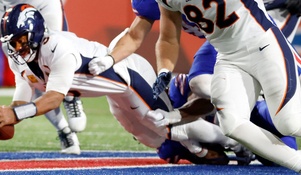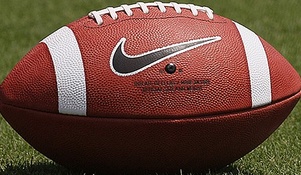To Bowl or Not to Bowl: That is the Question
Bowl season is already upon us, and this year it comes with some controversy. And no, it’s not the controversy over which teams should make the playoff, even though there is plenty of that to go around. Two of the premier players in college football, Leonard Fournette and Christian McCaffrey, have decided to skip their respective bowl games and focus on the NFL draft. The idea to forgo the bowl games was likely sparked by last year’s crushing knee injury to former Notre Dame linebacker Jaylon Smith that caused him to drop out of the top ten and all the way into the second round. Fournette and McCaffrey don’t have any explaining to do. Their logic is sound, but it looks like the start of a selfish and apathetic trend that could be devastating for college football.
The motive behind the move is clear, and it’s not “to begin draft prep immediately,” as McCaffrey cited. Christian McCaffrey isn’t going to gain any skills in this two-week period that he didn’t already have. Leonard Fournette isn’t going to all of a sudden become a pass-catching weapon. These guys know their strengths, and they will be more than ready for the NFL combine regardless of whether or not they have an extra two weeks to prepare. The real motive is to prevent injury, an injury that can severely damage draft stock that is already so high. They don’t want to incur the risk of injury that is prevalent every time a player steps out onto the football field just one more time to win a bowl game at the end of the season with their team. The risk of injury in football is well-understood. If any of these student-athletes had any doubts about it, they wouldn’t have suited up in the first place. Instead they want to pick and choose when they think it’s beneficial to play and when it’s not worth the risk. It is a move that benefits the player’s self-interest at the expense of the team, the coaching staff, the program, and the school.
While I get players skipping their bowl game-what happened to LOVING the GAME & wanting to compete 1 more time w/ your boys-Disturbing trend
— Kirk Herbstreit (@KirkHerbstreit) December 19, 2016
As far as love of the game goes, that’s a personal decision. Nobody is asking these young running backs to prove their passion for football. Andre Agassi had an unbelievable career in tennis despite hating the sport all the way through. What is expected of these players is that they continue to support their team and their fellow athletes who don’t have the luxury of skipping a game and cashing out. When players are recruited and offered football scholarships, schools are allocating a limited number of positions for players that they expect to play for them. The school is making an investment in the player, and the player is using that as a stepping stone to the NFL. If the player does not want to play for a full year, that is their prerogative, but each year players sign a letter of intent. A letter of intent is not just something a player signs when they commit to a school. It is a document that says that they will work and compete to the same standard of the other student-athletes, and it is renewed every year before the season starts. Football isn’t a game where you can pick and choose when you feel like playing. It’s a team game, and because one player has a greater future in the sport doesn’t mean that he should opt out of playing to protect himself when his teammates continue to put their bodies on the line.

The argument made against playing always hinges upon the fact that at any moment a player can suffer a career-threatening injury, but that chance is extremely slim. There is no doubt that football is a dangerous sport, but players aren’t tearing ACL’s left and right in their bowl games. What they are doing are downplaying the importance of these bowl games. Schools like Stanford and LSU clearly shouldn’t be thrilled to be playing in the Sun Bowl and the Citrus Bowl, but these bowl games generate huge fan bases in other areas, and generate revenue for the schools and the programs. They are also instrumental for a number of other players that are seeking draft recognition. Raise your hand if you have ever heard the name Ethan Pocic. If you have, you either root for LSU or are an avid NFL draft enthusiast, but Pocic is the starting center for LSU. He is also a guy who is a projected second round pick in this upcoming NFL draft, and a fringe first rounder. Pocic plays a big part in LSU’s running game, as Fournette primarily runs the ball right up the middle, with Pocic often opening holes for him. He would be a player to watch in the Citrus bowl for many NFL scouts, whether they came to see Fournette or him. However, with Fournette sitting out the game, Pocic will not only get less recognition, but he doesn’t get the opportunity to benefit from Fournette having a great game, and likely be able to push his stock into first round status. What if Pocic, or any other lineman, decided to sit out and it led to an injury to their team's running back or quarterback? Imagine the backlash toward the lineman then. Why do we condone the reverse? The business of players deciding whether or not a game is important enough to them is ultimately a selfish choice, and it speaks to how much a player cares about their team and their program.
This rationale works under the assumption that college football has no inherent value beyond playing for a championship, and in a sport with 128 division one teams, that can’t be the case. If this is the mentality that these moves are promoting, we are bound to see players quitting much earlier than a week before the season’s end. Four games into the season, Deshone Kizer was the top quarterback prospect in college football. Notre Dame was 1-3 with a tough schedule coming up and virtually no chance of playing in a big bowl game (it turns out they didn’t make one at all). Deshone Kizer could have easily sat out the last eight games and remained a top quarterback prospect with no risk of injury and had ample time to prepare for the draft. Malik McDowell of Michigan State could have done the same. In the words of Kirk Herbstreit, this is a “disturbing trend” that could result in college football missing its top players for large portions of the season as they sit and await their NFL futures. College football would be losing its superstars during the times when it needs them most. The solution may be in the works, but the problem is clear, and it only took a couple self-interested individuals to kickstart it.





